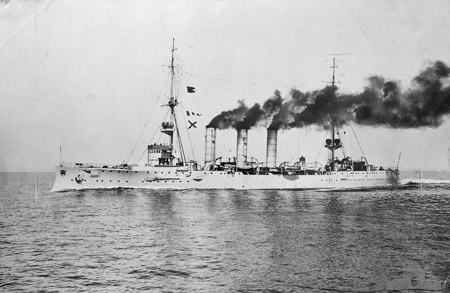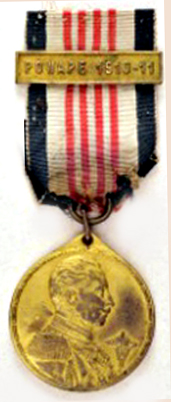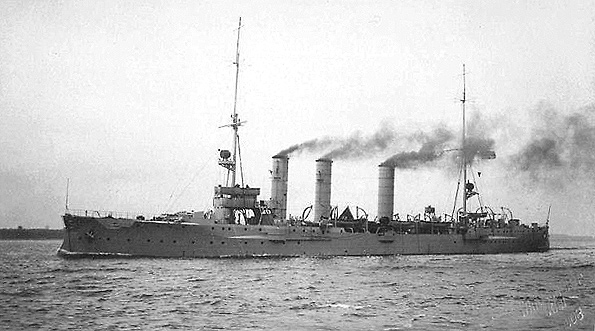Imperial German Colonial Awards
German Ponape
German Ponape (now Phonpei) was acquired along with several other South Pacific posessions from Spain in 1899 following the Spanish American War in 1898.
The Germans instituted land reform designed to replace the existing feudal system with private, deeded ownership. This served to diminish the power and economic advantages of the tribal chiefs, who had previously owned all the land. In lieu of property taxes, private landowners were required to donate 15 days labor on various public work projects. This work for taxes system led to a rebellion on Sokehs Island.
Starting during October 1910, as a simple act of insubordination by members of the Sokehs tribe, it led to the deaths of nine people followed by the arrest of 36 Sokehs and the execution of fifteen of those apprehended.
On October 17, 1910, a group of Sokehs were assigned to a road construction project on their island (Sokehs Island). When one young tribal member refused to follow the orders of the German supervisor ordered him flogged. The next day, a Sokehs section chief ordered all of the laborers to refuse to perform any further work.
District commissioner Gustav Boeder was informed of the incident and together with his assistant Rudolf Brauckmann and two translators was rowed to the island by six boatmen. As the group approached the Sokehs workers, Boeder was shot and killed. In short order the rebels then killed Brauckmann, Häfner, Hollborn and five boatmen. The two translators and one of the boatmen escaped. The Sokehs then occupied a defensive position in the mountains.
German officials then determined that the rebellious Sokehs needed to be punished, but it was not until November 26 that a report could be dispatched to the German Headquarters at Rabaul, Papua New Guinea. The message was forwarded to Berlin reaching their on December 26. In the meantime, Governor Albert Hahl on Rabaul dispatched the gunboat SMS Cormoran and the survey ship Planet with 163 newly hired native police recruits. The ships arrived during mid-December 1910.The new police recruits met with little success and their German commander, Lieutenant Karl Kammerich was harshly critical of their performance.
In response to the news from Ponape, the Berlin Admiralty ordered the SMS Emden, a light cruiser, to proceed to the Caroline Islands. The light cruiser SMS Nurnberg, anchored at Hong Kong, was ordered to join the Emden. Both ships arrived at Ponape on January 10, 1911.

SMS Emden
On January 13, the Emden's captain, Lieutenant Commander Waldemar Vollerthun, ordered the main batteries of both cruisers to fire on the rebel fortifications. An assault team of marines armed with rifles and 30 native policemen captured the rebel hideout. The rebels fought a guerilla-style resistance, but lack of food, the absence of support from other tribes, and continual movement and flight exhausted the Sokehs warriors. On February 13, 1911, the leader and five other rebels surrendered. The remaining rebels surrendered on February 22, 1911.

Imperial German Colonial Medal with Bar: PONAPE 1910/1911

SMS Nurnberg
During the ground assault, the Germans lost one junior officer, two enlisted men and two native policemen. In addition, one German officer, five marines and nine native policemen were wounded. The Sokehs incurred six killed and an unknown number wounded.
Immediately after cessation of fighting, a summary trial was convened for 36 rebels. The court convicted 17 for two main offenses: (1) the murder of 4 German officials and five island boatmen, and (b) for insurrection. They 17 were condemned to death. An additional 12 received multi-year sentences at hard labor. Seven were exonerated and set free. On February, 24 1911, 15 rebels were executed by a native police firing squad. The other two condemned rebels had their death sentences commuted.
The German government subsequently decided to rid Ponape of the Sokehs and banished the entire tribe of 426 members to Babelthaup, the largest island in German Palau.
During World War I, all German islands north of the equator were occupied by Japanese forces. Japan was granted administration of the German islands by the Treaty of Versailles.
German Ponape
German Ponape (now Phonpei) was acquired along with several other South Pacific posessions from Spain in 1899 following the Spanish American War in 1898.
The Germans instituted land reform designed to replace the existing feudal system with private, deeded ownership. This served to diminish the power and economic advantages of the tribal chiefs, who had previously owned all the land. In lieu of property taxes, private landowners were required to donate 15 days labor on various public work projects. This work for taxes system led to a rebellion on Sokehs Island.
Starting during October 1910, as a simple act of insubordination by members of the Sokehs tribe, it led to the deaths of nine people followed by the arrest of 36 Sokehs and the execution of fifteen of those apprehended.
On October 17, 1910, a group of Sokehs were assigned to a road construction project on their island (Sokehs Island). When one young tribal member refused to follow the orders of the German supervisor ordered him flogged. The next day, a Sokehs section chief ordered all of the laborers to refuse to perform any further work.
District commissioner Gustav Boeder was informed of the incident and together with his assistant Rudolf Brauckmann and two translators was rowed to the island by six boatmen. As the group approached the Sokehs workers, Boeder was shot and killed. In short order the rebels then killed Brauckmann, Häfner, Hollborn and five boatmen. The two translators and one of the boatmen escaped. The Sokehs then occupied a defensive position in the mountains.
German officials then determined that the rebellious Sokehs needed to be punished, but it was not until November 26 that a report could be dispatched to the German Headquarters at Rabaul, Papua New Guinea. The message was forwarded to Berlin reaching their on December 26. In the meantime, Governor Albert Hahl on Rabaul dispatched the gunboat SMS Cormoran and the survey ship Planet with 163 newly hired native police recruits. The ships arrived during mid-December 1910.The new police recruits met with little success and their German commander, Lieutenant Karl Kammerich was harshly critical of their performance.
In response to the news from Ponape, the Berlin Admiralty ordered the SMS Emden, a light cruiser, to proceed to the Caroline Islands. The light cruiser SMS Nurnberg, anchored at Hong Kong, was ordered to join the Emden. Both ships arrived at Ponape on January 10, 1911.

SMS Emden
On January 13, the Emden's captain, Lieutenant Commander Waldemar Vollerthun, ordered the main batteries of both cruisers to fire on the rebel fortifications. An assault team of marines armed with rifles and 30 native policemen captured the rebel hideout. The rebels fought a guerilla-style resistance, but lack of food, the absence of support from other tribes, and continual movement and flight exhausted the Sokehs warriors. On February 13, 1911, the leader and five other rebels surrendered. The remaining rebels surrendered on February 22, 1911.

Imperial German Colonial Medal with Bar: PONAPE 1910/1911

SMS Nurnberg
During the ground assault, the Germans lost one junior officer, two enlisted men and two native policemen. In addition, one German officer, five marines and nine native policemen were wounded. The Sokehs incurred six killed and an unknown number wounded.
Immediately after cessation of fighting, a summary trial was convened for 36 rebels. The court convicted 17 for two main offenses: (1) the murder of 4 German officials and five island boatmen, and (b) for insurrection. They 17 were condemned to death. An additional 12 received multi-year sentences at hard labor. Seven were exonerated and set free. On February, 24 1911, 15 rebels were executed by a native police firing squad. The other two condemned rebels had their death sentences commuted.
The German government subsequently decided to rid Ponape of the Sokehs and banished the entire tribe of 426 members to Babelthaup, the largest island in German Palau.
During World War I, all German islands north of the equator were occupied by Japanese forces. Japan was granted administration of the German islands by the Treaty of Versailles.
Website Maintained by Vaudezilla